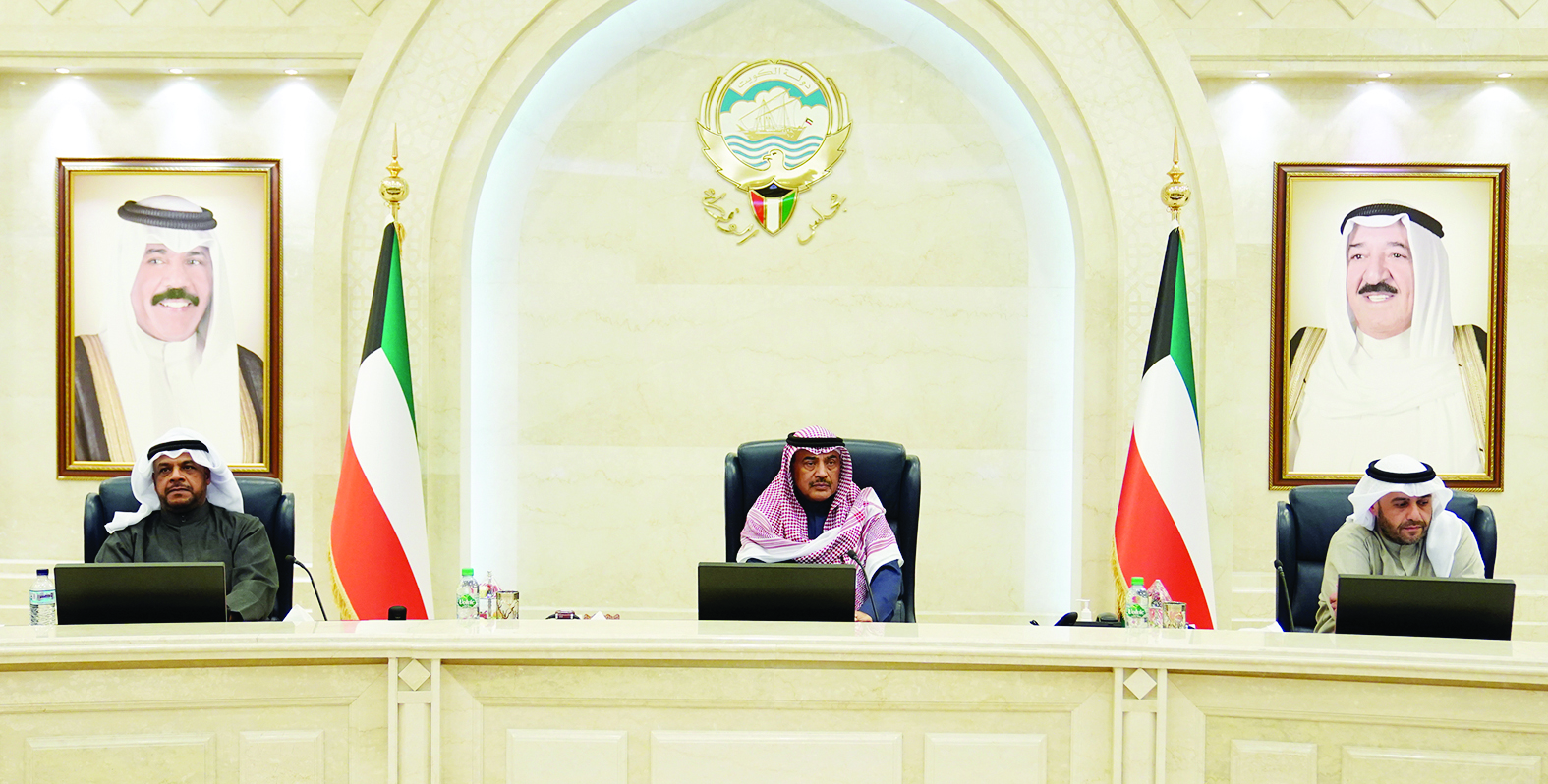
KUWAIT: Kuwait's Cabinet held an extraordinary meeting Tuesday at the Seif Palace headed by His Highness the Prime Minister Sheikh Sabah Al-Khaled Al-Hamad Al-Sabah. Deputy Prime Minister, Minister of Interior and Minister of State for Cabinet Affairs Anas Al-Saleh said the following after the meeting: Within the framework of following up the effects of economic and social repercussions of the exceptional measures taken by the state in the face of the coronavirus pandemic, the cabinet reviewed a report from the joint economic team between government agencies and the private sector to provide practical scenarios to address the economic repercussions and mitigate its effects.
The cabinet discussed the results of team's work in which more than 82 persons with expertise, specialization and representatives of local associations and federations as well as specialized international institutions participated, explaining the unique and unprecedented nature of this global crisis, whose effects and repercussions included all countries of the world.
It also discussed the contents of the report aimed at confirming the state's ability and keenness to preserve the fundamentals of the national economy, avoid the costs that might arise from stopping the wheel of the national economy at various levels, and avoid negative effects in some economic sectors, including maintaining the credit rating of Kuwait.
Basic principles
The report clarified the basic principles that were based on presenting the team's perceptions, which were represented in:
- Protecting public capital and rationalizing its use in the interest of the public, while emphasizing that these measures are to ensure the continued rotation of the economic activity, and not to compensate companies or individuals.
- Commitment to full transparency in the implementation and follow-up of procedures.
- Ensuring social protection for citizens.
- Maintaining the national employees' conditions in the private sector and increasing their numbers.
- Investing the proposed measures in support of structural reforms of the economy.
- Providing various ways of support and facilities subject to commitment to the requirements of national economy structural reforms.
Social protection
In this regard, the report examined a number of measures aimed at social protection, including:
- Ensure the safety of the citizens working in the sectors affected by the repercussions of the crisis.
- Maintaining the necessary support to maintain stability in the levels and prices of food and medical commodities in local markets.
- Establishing a mechanism to secure the minimum income that ensures facing the cost of living for workers affected by the current crisis and linked to contracts.
- Support the salaries of those registered under Chapter 5 in social security in the affected sectors.
- Assist owners of small, medium, industrial and agricultural projects by postponing the installments funded by the National Fund for Small and Medium Enterprises Development and the agricultural finance portfolio in the Industrial Bank.
- Providing loans on concessional and long terms to small and medium enterprises, through joint financing from local banks and the National Fund for Small and Medium Enterprise (SME) Development.
- Providing soft and long-term loans on the affected companies and clients, provided by local banks.
- Postponing the share of business owners in the private and oil sectors not fully owned by the state from the monthly contributions due to the Public Institution for Social Security for a period of six months, in addition to postponing the payment of the monthly contributions due to the insured in accordance with the provisions of Chapter Five of the Social Security Law for a period of six months, as well Postponing the deduction of the replacement part of the retirement pension according to Article 77 of the Law for a period of six months.
- Payment of the retirement pension on the assumption that what the law permits is not disbursed in advance for cases that have benefited from the provision of Article 112 of the Social Security Law for a period of six months, provided that the legal instrument necessary to implement this decision is specified.
- Provide government exemptions to the affected economic institutions in the productive sectors and the cooperative societies from some government fees and dues if these exemptions are reflected on their clients with the same value.
- Instruct government bodies to expedite routine work cycle to pay the obligations due to the private sector as quickly as possible.
The report also included the legislative requirements necessary to implement its recommendations related to the governance and follow-up of the implementation of the proposed procedures, and ended with the formation of a higher steering committee to follow up, evaluate and implement the procedures and a strategic and technical support team in order to ensure the implementation of these procedures.
The cabinet has set up a committee headed by the Governor of the Central Bank of Kuwait and the membership of Undersecretary of the Ministry of Finance, and the managing director of the General Investment Authority to put the incentive pillars of the local economy. - KUNA








